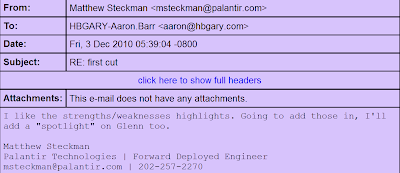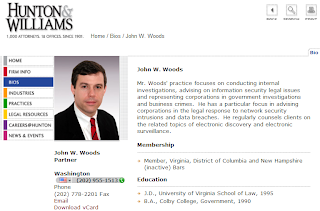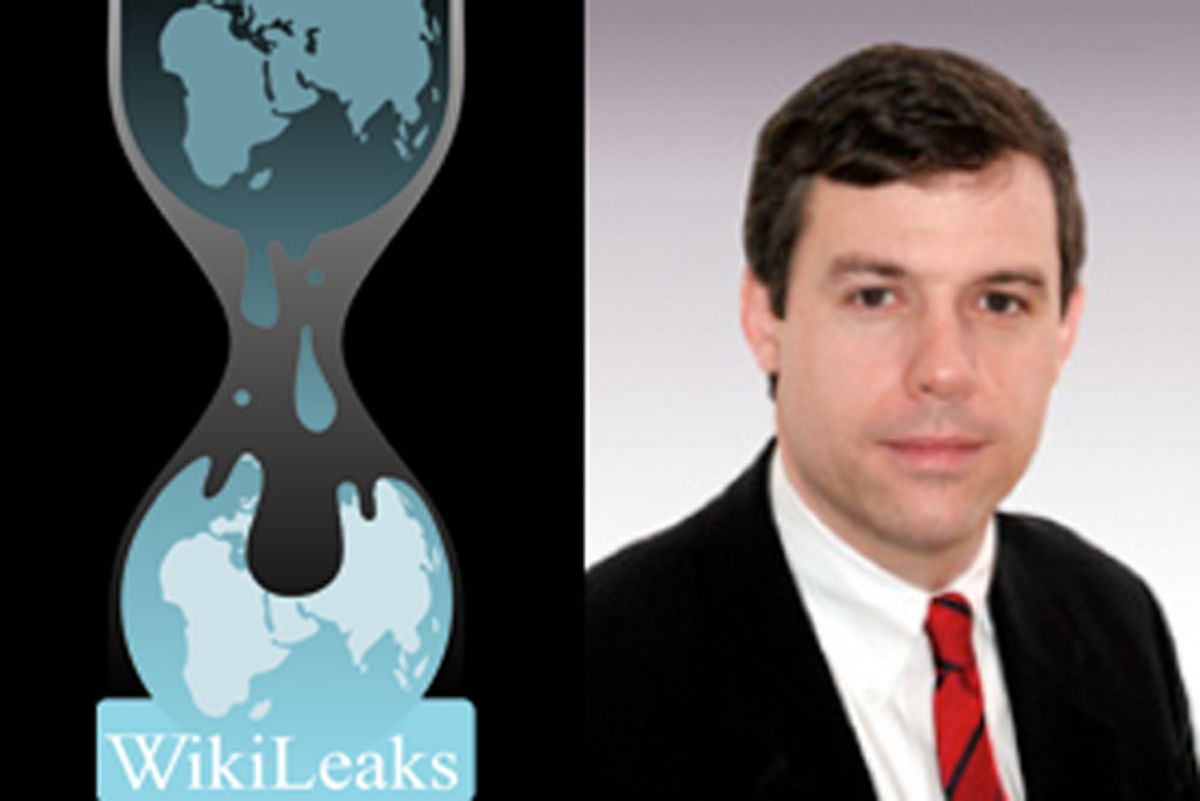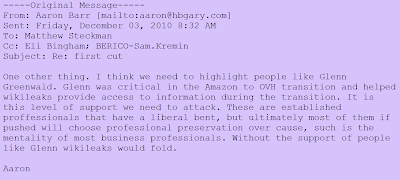(updated below - Update II - Update III - Update IV)
As I noted on Friday, the parties implicated in the smear campaigns aimed at WikiLeaks supporters and Chamber of Commerce critics have attempted to heap all the blame on HBGary Federal ("HBGary") and its CEO, Aaron Barr. Both Bank of America and the Chamber -- the intended clients -- vehemently deny any involvement in these schemes and have harshly denounced them. The other two Internet security firms whose logos appeared on the proposals -- Palantir Technologies and Berico Technologies -- both issued statements terminating their relationship with HBGary and insisting that they had nothing to do with these plots. Only Hunton & Williams and its partner, John Woods -- the central cogs soliciting these proposals -- have steadfastly refused to comment.
Palantir, in particular, has been quite aggressive about trying to distance itself. They initially issued a strong statement denouncing the plots, then had their CEO call me vowing to investigate and terminate any employees who were involved, then issued another statement over the weekend claiming that "Palantir never has and never will condone the sort of activities that HBGary recommended" and "Palantir did not participate in the development of the recommendations that Palantir and others find offensive." Such vehemence is unsurprising: the Palo-Alto-based firm relies for its recruitment efforts on maintaining a carefully cultivated image as a progressive company devoted to civil liberties, privacy and Internet freedom -- all of which would be obviously sullied by involvement in such a scheme.
But as Salon's Justin Elliott reports, there are newly emerged facts which directly contradict Palantir's denials. On Sunday night, Anonymous released an additional 25,000 emails from HBGary, and Forbes' Andy Greenberg was the first to make this discovery:
The emails also show that it was Barr who suggested pressuring Salon.com journalist Glenn Greenwald, though Palantir, another firm working with HBGary Federal, quickly accepted that suggestion and added it to the PowerPoint presentation that the group was assembling.
Greenberg is referring to this series of emails, first from HBGary's Barr -- addressed to Palantir's Matthew Steckman and Eli Bingham along with Berico's Sam Kremin (click image to enlarge):
This was the reply from Palantir's Steckman to that email:
 Roughly 15 minutes later, Steckman sent another email to Barr: "Updated with Strengths/Weaknesses and a spotlight on Glenn Greenwald...thanks Aaron!" -- indicating he had included the slide featuring this scheme. So much for Palantir's insistence that they "did not participate in the development of the recommendations." As Elliott noted, "Steckman's role in creating the slideshow -- which, it should be noted, also carries Palantir's logo -- would seem to contradict the company's" denials.
Roughly 15 minutes later, Steckman sent another email to Barr: "Updated with Strengths/Weaknesses and a spotlight on Glenn Greenwald...thanks Aaron!" -- indicating he had included the slide featuring this scheme. So much for Palantir's insistence that they "did not participate in the development of the recommendations." As Elliott noted, "Steckman's role in creating the slideshow -- which, it should be noted, also carries Palantir's logo -- would seem to contradict the company's" denials.
Last night, both Elliott and I sent emails to Palantir's General Counsel asking the company to reconcile this obvious contradiction. In response, they issued a statement announcing that they "have decided to place Matthew Steckman, 26 year old engineer, on leave pending a thorough review of his actions." They added that Palantir "was not retained by any party to develop such recommendations and indeed it would be contrary to Palantir’s ethics, culture and policies to do so" (Elliott has posted Palantir's full statement).
So apparently, if Palantir's new version is to be believed, a 26-year-old engineer went off on his own and -- without any supervision or direction -- participated in the development of odious smear campaigns intended for two of the nation's deepest-pocket organizations (Bank of America and the Chamber), potential clients which the emails repeatedly emphasize would be very lucrative. I'll leave it to others to decide how credible that version is, but I will note that several facts undermine it:
First, another Palantir employee besides Steckman-- Eli Bingham -- was one of the recipients of Barr's original email proposing this smear campaign. Second, this proposal was being developed immediately before (and for consideration at) a conference call that included Hunton & Williams' Woods, HBGary's Barr, a Berico official, and both Steckman and Bingham on behalf of Palantir (see the bottom email here); was a 26-year-old mid-level engineer the only Palantir official aware of what they were proposing to H&W in order to attract the Bank and the Chamber's business? Third, there's no question -- as this article yesterday from The San Francisco Business Times documents -- that at least three Palantir employees (Steckman, Bingham and Ryan Castle) were all sent emails containing the proposals to smear critics of the Chamber of Commerce, including ThinkProgress. That article notes that these newly released emails "suggest that staff at Palantir Technologies, a high-profile data analysis company co-founded by ex-PayPal CEO Peter Thiel, may have helped prepare a proposal for the U.S. Chamber of Commerce to undermine a pro-labor publication called ThinkProgress with dirty tricks." Whatever else is true, Palantir's knowledge of and involvement in these proposals is more extensive than it originally claimed, and extends beyond the 26-year-old scapegoat just placed on leave.
 But the real party here which deserves much more scrutiny is Hunton & Williams -- one of the most well-connected legal and lobbying firms in DC -- and its partner John Woods. Using teams of people scouring all the available emails, FDL has done its typically thorough job of setting forth all the key facts and the key players -- including from Booz Allen -- and Woods is at the center of all of it: the key cog acting on behalf of the Bank of America and the Chamber. It's Woods who is soliciting these firms to submit these proposals, pursuant to work for the Chamber and the Bank; according to Palantir emails, H&W was recommended to the Bank by the Justice Department to coordinate the anti-WikiLeaks work.
But the real party here which deserves much more scrutiny is Hunton & Williams -- one of the most well-connected legal and lobbying firms in DC -- and its partner John Woods. Using teams of people scouring all the available emails, FDL has done its typically thorough job of setting forth all the key facts and the key players -- including from Booz Allen -- and Woods is at the center of all of it: the key cog acting on behalf of the Bank of America and the Chamber. It's Woods who is soliciting these firms to submit these proposals, pursuant to work for the Chamber and the Bank; according to Palantir emails, H&W was recommended to the Bank by the Justice Department to coordinate the anti-WikiLeaks work.
Despite being at the center of this increasingly disturbing scandal, Woods and H&W steadfastly refuse to comment to anyone. As The New York Times noted on Saturday when reporting this story: "A Hunton & Williams spokesman did not comment." For a lawyer to be at the center of an odious and quite possibly illegal scheme to target progressive activists and their families, threaten the careers of journalists as a means of silencing them, and fabricate forged documents intended for public consumption -- and then steadfastly refuse to comment -- is just inexcusable. Perhaps some polite email and telephone encouragement from the public is needed for Woods to account for what he and his firm have done. In exchange for the privileges lawyers receive (including the exclusive right to furnish legal advice, represent others, and act as officers of the court), members of the Bar have particular ethical obligations to the public. At the very least, the spirit -- if not the letter -- of those obligations is being seriously breached by a lawyer who appears to be at the center of these kinds of pernicious, lawless plots and then refuses to account to the public for what he did.
Given my involvement in this story, I'm going to defer to others in terms of the reporting. But -- given the players involved and the facts that continue to emerge -- this story is far too significant to allow to die due to lack of attention. Many of the named targets are actively considering commencing civil proceedings (which would entail compulsory discovery) as well as ethical grievances with the relevant Bar associations. As the episode with Palantir demonstrates, simply relying on the voluntary statements of the corporations involved ensures that the actual facts will remain concealed if not actively distorted. The DOJ ought to investigate this as well, but for reasons I detailed on Friday, that is unlikely in the extreme. Entities of this type routinely engage in conduct like this with impunity, and the serendipity that led to their exposure in this case should be seized to impose some accountability. That this was discovered through a random email hack -- and that these firms felt so free to propose these schemes in writing and, at least from what is known, not a single person raised any objection at all -- underscores how common this behavior is.
Yesterday, I did a 20-minute interview with Sam Seder about this case and its significance, which can be heard on the player below (the transcript is here); see also, these important new facts discovered by Marcy Wheeler. I also recorded a 30-minute discussion yesterday with MSNBC's Dylan Ratigan, which he will post later today (I'll provide the link when he does), and I'll also be on MSNBC at roughly 4:00 pm EST discussing this and related matters.
UPDATE: The Guardian now joins The New York Times in reporting on this story, and supplies some new, interesting details (and, naturally, Hunton & Williams failed to respond to requests to comment).
UPDATE II: Writing in Wired, Nate Anderson of Ars Technica has a truly superb account of what happened here, with a focus on the responsibility and knowledge of the executives at the implicated firms. The whole article should be read, but here's a sample:
By October 2010, Barr was under considerable stress. His CEO job was under threat, and the e-mails show that the specter of divorce loomed over his personal life.
On Oct. 19, a note arrived. HBGary Federal might be able to provide part of "a complete intelligence solution to a law firm that approached us." That law firm was DC-based powerhouse Hunton & Williams, which boasted 1,000 attorneys and terrific contacts. . . .
The three firms [HBGary, Berico and Palantir] needed a name for their joint operation. One early suggestion: a “Corporate Threat Analysis Cell.” Eventually, a sexier name was chosen: Team Themis.. . .
Team Themis decided to ask for $2 million per month, for six months, for the first phase of the project, putting $500,000 to $700,000 per month in HBGary Federal's pocket.
But the three companies disagreed about how to split the pie. In the end, Palantir agreed to take less money, but that decision had to go "way up the chain (as you can imagine)," wrote the Palantir contact for Team Themis. "The short of it is that we got approval from Dr. Karp and the Board to go ahead with the modified 40/30/30 breakdown proposed. These were not fun conversations, but we are committed to this team and we can optimize the cost structure in the long term (let’s demonstrate success and then take over this market :) )."
The leaders at the very top of Palantir were aware of the Team Themis work, though the details of what was being proposed by Barr may well have escaped their notice. Palantir wasn't kidding around with this contract; if selected by H&W and the Chamber, Palantir planned to staff the project with an experienced intelligence operative, a man who "ran the foreign fighter campaign on the Syrian border in 2005 to stop the flow of suicide bombers into Baghdad and helped to ensure a successful Iraqi election. As a commander, [he] ran the entire intelligence cycle: identified high-level terrorists, planned missions to kill or capture them, led the missions personally, then exploited the intelligence and evidence gathered on target to defeat broader enemy networks" . . . .
But before H&W made a decision on Chamber of Commerce plan, it had another urgent request for Team Themis: a major U.S. bank had come to H&W seeking help against WikiLeaks (the bank has been widely assumed to be Bank of America, which has long been rumored to be a future WikiLeaks target.)
"We want to sell this team as part of what we are talking about," said the team’s H&W contact. "I need a favor. I need five to six slides on Wikileaks -- who they are, how they operate and how this group may help this bank. . . ."
After the Anonymous attacks and the release of Barr’s e-mails, his partners furiously distanced themselves from Barr's work. Palantir CEO Dr. Alex Karp wrote, "We do not provide — nor do we have any plans to develop -- offensive cyber capabilities . . . ." Berico said (PDF) that it "does not condone or support any effort that proactively targets American firms, organizations or individuals. We find such actions reprehensible and are deeply committed to partnering with the best companies in our industry that share our core values. Therefore, we have discontinued all ties with HBGary Federal."
But both of the Team Themis leads at these companies knew exactly what was being proposed (such knowledge may not have run to the top). They saw Barr's e-mails, and they used his work. His ideas on attacking WikiLeaks made it almost verbatim into a Palantir slide about "proactive tactics."
Anderson has written the definitive account thus far about the facts showing the involvement of each of these companies, and I encourage everyone to read his whole article.
UPDATE III: The discussion I had yesterday with Dylan Ratigan about this matter, along with a full transcript, can be found here.
UPDATE IV: Here is the MSNBC segment I did today on this story; the host was NPR's Matt Miller:




Shares